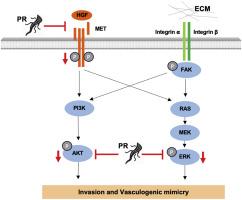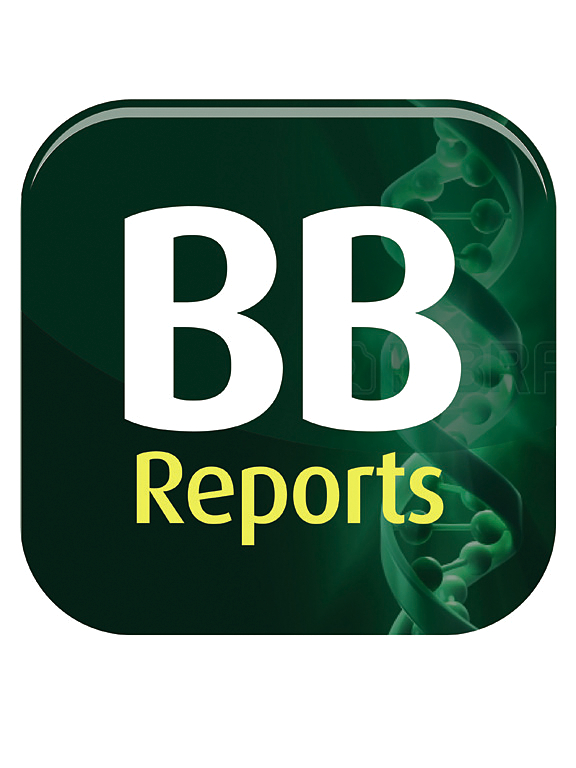Pomegranate root extract possesses anti-metastatic potential by suppressing invasiveness and vasculogenic mimicry capability of cancer cells
IF 2.2
Q3 BIOCHEMISTRY & MOLECULAR BIOLOGY
引用次数: 0
Abstract
Cancer metastasis is a serious problem in cancer treatment. Metastasis is driven by cancer invasiveness and facilitated by angiogenesis of endothelial cells. Collective evidence revealed that highly invasive cancer cells possess vasculogenic mimicry (VM) capability by forming non-endothelial capillaries that mimic blood vessels. Moreover, VM also resists anti-angiogenic drugs. Thus, anti-invasion and anti-VM are necessary approaches required for anti-metastasis therapy. Pomegranate plants (Punica granatum L.) have been used in traditional medicines since ancient times. Different parts of the pomegranate tree possess the ability to inhibit cancer cell invasion and migration, but there is no report for pomegranate roots. This study aimed to explore anti-metastatic and anti-VM effects of pomegranate root extract (PR) in a human lung cancer cell line (A549) and a VM-forming human hepatocellular carcinoma cell line (SK-Hep-1). At less cytotoxic concentrations (lower than IC20 values), PR dose-dependently reduced invasion, migration, and MMPs production in both A549 and SK-Hep-1 cell lines. PR also inhibited VM formation in SK-Hep-1 cells. Mechanistic studies revealed that, in A549 cells, PR inhibited hepatocyte growth factor (HGF)-induced activation of MET and its downstream AKT and ERK pathways. During VM formation of SK-Hep-1 cells, PR downregulated AKT and ERK signaling pathways without affecting their upstream activator, FAK phosphorylation. Phytochemical profiling of PR analyzed by LC-MS revealed tannins and ellagic acid derivatives were the major classes of natural products present in PR. This research reveals a novel health benefit of pomegranate roots in cancer metastasis therapy.

石榴根提取物通过抑制癌细胞的侵袭性和血管生成模拟能力而具有抗转移潜能
肿瘤转移是肿瘤治疗中的一个严重问题。转移是由肿瘤侵袭驱动,内皮细胞的血管生成促进。集体证据表明,高度侵袭性癌细胞具有血管生成模仿(VM)能力,形成非内皮毛细血管,模仿血管。此外,VM还能抵抗抗血管生成药物。因此,抗侵袭和抗vm是抗转移治疗的必要途径。石榴植物(Punica granatum L.)自古以来就被用于传统药物。石榴树的不同部位都具有抑制癌细胞侵袭和迁移的能力,但没有关于石榴树根的报道。本研究旨在探讨石榴根提取物(PR)对人肺癌细胞株(A549)和形成vm的人肝癌细胞株(SK-Hep-1)的抗转移和抗vm作用。在较低的细胞毒性浓度(低于IC20值)下,PR剂量依赖性地减少了A549和SK-Hep-1细胞系的侵袭、迁移和MMPs的产生。PR还能抑制SK-Hep-1细胞VM的形成。机制研究显示,在A549细胞中,PR抑制肝细胞生长因子(HGF)诱导的MET及其下游AKT和ERK通路的激活。在SK-Hep-1细胞VM形成过程中,PR下调AKT和ERK信号通路,而不影响其上游激活因子FAK的磷酸化。通过LC-MS分析石榴根的植物化学特征,发现单宁和鞣花酸衍生物是石榴根中主要的天然产物。该研究揭示了石榴根在癌症转移治疗中的新的健康益处。
本文章由计算机程序翻译,如有差异,请以英文原文为准。
求助全文
约1分钟内获得全文
求助全文
来源期刊

Biochemistry and Biophysics Reports
Biochemistry, Genetics and Molecular Biology-Biophysics
CiteScore
4.60
自引率
0.00%
发文量
191
审稿时长
59 days
期刊介绍:
Open access, online only, peer-reviewed international journal in the Life Sciences, established in 2014 Biochemistry and Biophysics Reports (BB Reports) publishes original research in all aspects of Biochemistry, Biophysics and related areas like Molecular and Cell Biology. BB Reports welcomes solid though more preliminary, descriptive and small scale results if they have the potential to stimulate and/or contribute to future research, leading to new insights or hypothesis. Primary criteria for acceptance is that the work is original, scientifically and technically sound and provides valuable knowledge to life sciences research. We strongly believe all results deserve to be published and documented for the advancement of science. BB Reports specifically appreciates receiving reports on: Negative results, Replication studies, Reanalysis of previous datasets.
 求助内容:
求助内容: 应助结果提醒方式:
应助结果提醒方式:


